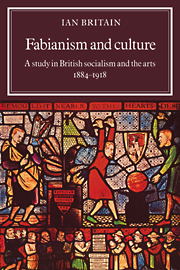Book contents
- Frontmatter
- Contents
- Preface
- List of abbreviations
- Introduction
- PART I THE LITERARY AND ARTISTIC ORIGINS OF FABIAN SOCIALISM
- 1 Thomas Davidson, the New Life Fellowship and the earliest Fabians
- 2 The young Webbs: towards a socialist partnership
- 3 Three Fabian essayists and William Morris
- 4 Bernard Shaw
- PART II ART, AUSTERITY AND PLEASURE IN FABIAN SOCIALISM
- PART III FABIANISM, ÉLITISM AND POPULAR CULTURE
- Conclusion
- Notes
- Bibliography
- Index
1 - Thomas Davidson, the New Life Fellowship and the earliest Fabians
Published online by Cambridge University Press: 29 September 2009
- Frontmatter
- Contents
- Preface
- List of abbreviations
- Introduction
- PART I THE LITERARY AND ARTISTIC ORIGINS OF FABIAN SOCIALISM
- 1 Thomas Davidson, the New Life Fellowship and the earliest Fabians
- 2 The young Webbs: towards a socialist partnership
- 3 Three Fabian essayists and William Morris
- 4 Bernard Shaw
- PART II ART, AUSTERITY AND PLEASURE IN FABIAN SOCIALISM
- PART III FABIANISM, ÉLITISM AND POPULAR CULTURE
- Conclusion
- Notes
- Bibliography
- Index
Summary
The origins of the Fabian Society, as an institution, are still a matter of dispute. The dispute centres on the precise relationship of the Society to a closely allied London coterie — the Fellowship of the New Life. One of these organizations began its independent existence by splitting off from the other, but uncertainties over the date of the official foundation of the Fellowship have made it difficult to tell which of the two bodies was the ‘parent’ and which the progeny that formally broke away. To attempt a full re-examination of this question here would be irrelevant to our present purpose, which is to focus not on the precise origins of the Fabian Society as an institution but, rather, on some neglected aspects of the general origins of Fabianism as represented by the ideas and activities of its early members. The significant fact to be kept in mind here is that personal or ‘family’ links of some substance existed between the members of the Fabian Society and the Fellowship of the New Life, and that these were never completely severed.
Whichever organization may be regarded as the immediate parent body, it is clear that the progenitor of both was an informal group of earnest middle-class young men who arranged meetings in London in 1882 and 1883 to converse with, and discuss the ideas of, a ‘wandering scholar’ and sage, Thomas Davidson.
- Type
- Chapter
- Information
- Fabianism and CultureA Study in British Socialism and the Arts c1884–1918, pp. 25 - 52Publisher: Cambridge University PressPrint publication year: 1982

